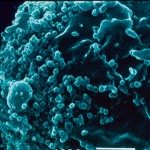Lien vers Pubmed [PMID] – 24777763
Eur. J. Immunol. 2014 Aug;44(8):2370-9
Natural killer (NK) cells are the major antiviral effector cell population of the innate immune system. It has been demonstrated that NK-cell activity can be modulated by the interaction with dendritic cells (DCs). The HIV-1 vaccine candidate Modified Vaccinia Ankara encoding an HIV polypeptide (MVA(HIV)), developed by the French National Agency for Research on AIDS (ANRS), has the ability to prime NK cells to control HIV-1 infection in DCs. However, whether or not MVA(HIV)-primed NK cells are able to better control HIV-1 infection in CD4(+) T cells, and the mechanism underlying the specific priming, remain undetermined. In this study, we show that MVA(HIV)-primed NK cells display a greater capacity to control HIV-1 infection in autologous CD4(+) T cells. We also highlight the importance of NKG2D engagement on NK cells and DC-produced IL-15 to achieve the anti-HIV-1 specific priming, as blockade of either NKG2D or IL-15 during MVA(HIV)-priming lead to a subsequent decreased control of HIV-1 infection in autologous CD4(+) T cells. Furthermore, we show that the decreased control of HIV-1 infection in CD4(+) T cells might be due, at least in part, to the decreased expression of membrane-bound IL-15 (mbIL-15) on DCs when NKG2D is blocked during MVA(HIV)-priming of NK cells.



